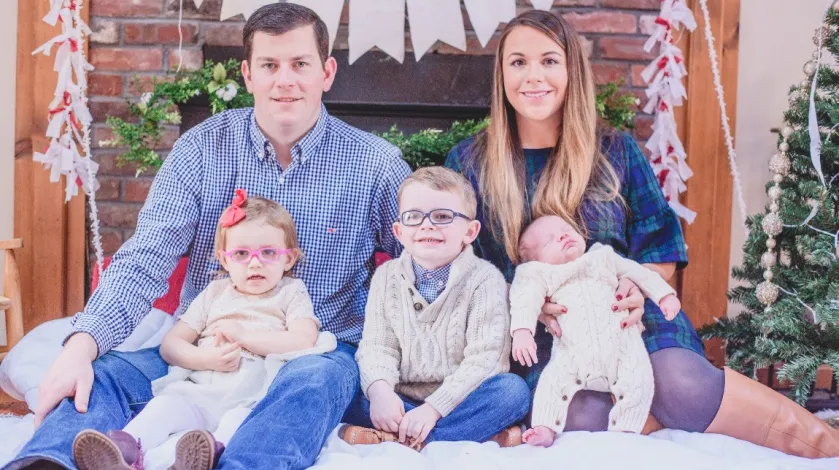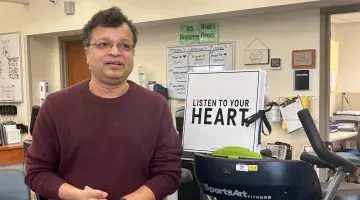The Cardiovascular Center Helps a Marshfield Man Get His (Heart) Rhythm Back
Author

South Shore Health
Brian Stewart of Marshfield has always been healthy and active. The 31-year-old retired U.S. Army Sergeant and current plumbing foreman was going about his busy day three years ago when out of nowhere he started to feel weak and his heart began pounding uncontrollably.
“It literally felt like my heart was going to come out of my chest,” Brian says.
Worried that things might get worse, he headed straight to the Emergency Department (ED) at South Shore Hospital. The ED team examined Brian right away and discovered a surprising problem: atrial fibrillation (AFib). AFib is an irregular heartbeat, which in and of itself is a fairly common heart problem. But the condition is rare for someone at Brian’s young age.
Repeat Visits to the Emergency Department
South Shore Hospital’s Cardiac Care Team was able to restore Brian’s heartbeat to a normal level using electrical cardioversion, a machine that sends an electric shock to the heart to return it to its normal rhythm. He soon returned to his daily routine, but the calm didn’t last. Brian returned to the ED two more times over the next 18 months with a soaring heart rate of 220 (an average healthy heart rate is 60-100).
Although Brian wasn’t happy about his increasing number of trips to South Shore Hospital’s ED, he was incredibly impressed by the care he received.
“Each time I went in, the clinical team was amazing,” Brian recalls. “I was seen right away, and they knew my history and exactly what I needed. After getting home, I always got a call from the Emergency Department to make sure I was doing okay. It was incredibly reassuring to get those calls.”
To find a permanent solution to Brian’s AFib, the Cardiac Care Team helped coordinate a visit with South Shore Hospital-affiliated cardiologist Dr. Seth McClennen, a cardiac electrophysiologist, which is a cardiologist who specializes in heart rhythm disorders.
Finding a Solution with Dr. McClennen
Brian met with Dr. McClennen to determine the root cause of his AFib and to discuss options for preventing further episodes. Thankfully, Brian’s AFib wasn’t a symptom of heart disease—it was just a case of bad luck, according to Dr. McClennen. Brian was diagnosed with supraventricular tachycardia, or SVT, a condition where abnormal cells within the heart send the wrong signals and cause an irregular rhythm.
While the simplest and least invasive treatment option was to put Brian on medications to control his heart rhythm and prevent blood clots, Dr. McClennen didn’t feel that this was the ideal option in the long-term.
“Using medication to treat Brian’s AFib would mean he would be on heart and blood thinner medication for the next 50-plus years,” says Dr. McClennen. “Given Brian’s age and how healthy he is, we felt that the best option was to try an ablation procedure to permanently fix the problem.”
In April of 2017, Brian went in for an outpatient procedure at the cardiac catheterization lab. In the procedure, Dr. McClennen used radio frequency energy to destroy the abnormal cells and tissue that were sending the wrong signals and causing Brian’s AFib.
Later that same day, Brian was recovering at home with his wife Megan when the phone rang. Dr. McClennen was calling to see how Brian was feeling after the ablation.
“He’s awesome to follow up with me personally after the procedure,” says Brian. “Not very many doctors do that these days. Dr. McClennen was always available whenever I needed anything. And he still is.”
“It’s important that I’m accessible to my patients,” says Dr. McClennen. “I encourage them to call, text or email me directly whenever they have any questions. Dealing with a medical problem can be nerve-wracking, and it helps to know that someone is available if they need anything.”
After a smooth recovery at home, Brian was AFib free for eight months. But the issue resurfaced again at the end of last year.
“With the ablation procedure, there is a 20 percent chance that you will need to go back in again to destroy more abnormal cells. That is exactly what happened with Brian,” says Dr. McClennen.
Not wanting to waste any time, Dr. McClennen and his team scheduled Brian for a second ablation in January.
So Far So Good
Brian’s second ablation procedure went smoothly and so far his recovery has been a success. He has slowly tapered off from the post-ablation medications and has made several lifestyle changes in an attempt to prevent any further heart issues. Brian will continue to see Dr. McClennen for follow-up appointments (and exchange funny emails back and forth) over the next several months, but he remains hopeful that he has finally turned a corner on his issue with AFib.
“He is just the best guy,” says Brian when talking about Dr. McClennen. “My whole care team has been amazing, from the emergency staff to the professionals managing my care and making my appointments to Dr. McClennen calling and texting to check in. I could not be more thankful for the care I received within South Shore Health System.”
Are you looking to give back to a South Shore Health caregiver that made a positive and meaningful impact in your life? You can make a gift to the South Shore Health Foundation in their honor. Visit our website to learn more about our Honor Your Caregiver program.
Author

South Shore Health







